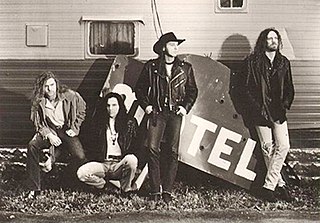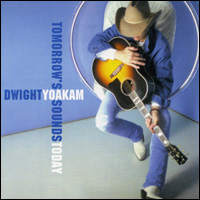
Southern rock is a subgenre of rock music and a genre of Americana. It developed in the Southern United States from rock and roll, country music, and blues and is focused generally on electric guitars and vocals. Author Scott B. Bomar speculates the term "Southern rock" may have been coined in 1972 by Mo Slotin, writing for Atlanta's underground paper, The Great Speckled Bird, in a review of an Allman Brothers Band concert.

Paul Bernard Rodgers is an English-Canadian singer, songwriter and musician. He was the lead vocalist of numerous successful rock bands, including Free, Bad Company, the Firm and the Law. He has also performed as a solo artist and collaborated with the remaining active members of Queen under the moniker Queen + Paul Rodgers, from 2004 until they parted ways in 2009. A poll in Rolling Stone magazine ranked him number 55 on its list of the "100 Greatest Singers of All Time". In 2011, Rodgers received the British Academy's Ivor Novello Award for Outstanding Contribution to British Music.

Howard Duane Allman was an American rock and blues guitarist and the founder and original leader of the Allman Brothers Band, for which he was posthumously inducted into the Rock and Roll Hall of Fame in 1995.

Gregory LeNoir Allman was an American musician, singer and songwriter. He was known for performing in the Allman Brothers Band. Allman grew up with an interest in rhythm and blues music, and the Allman Brothers Band fused it with rock music, jazz, and country. He wrote several of the band's most popular songs, including "Whipping Post", "Melissa", and "Midnight Rider". Allman also had a successful solo career, releasing seven studio albums. He was born and spent much of his childhood in Nashville, Tennessee, before relocating to Daytona Beach, Florida and then Macon, Georgia.

Layla and Other Assorted Love Songs is the only studio album by the English–American rock band Derek and the Dominos, released on 9 November 1970 as a double album by Polydor Records and Atco Records. It is best known for its title track, "Layla", which is often regarded as Eric Clapton's greatest musical achievement. The other band members were Bobby Whitlock, Jim Gordon, and Carl Radle (bass). Duane Allman played lead and slide guitar on 11 of the 14 songs.

"Layla" is a song written by Eric Clapton and Jim Gordon, originally recorded with their band Derek and the Dominos, as the thirteenth track from their only studio album, Layla and Other Assorted Love Songs (1970). Its contrasting movements were composed separately by Clapton and Gordon. The piano part has also been controversially credited to Rita Coolidge, Gordon's girlfriend at the time.

The Allman Brothers Band is the debut studio album by American rock band the Allman Brothers Band. Produced by Adrian Barber, it was released in the United States on November 4, 1969, by Atco Records subsidiary Capricorn. Formed in 1969, the Allman Brothers Band came together following various musical pursuits by each individual member. Guitarist and bandleader Duane Allman moved to Jacksonville, Florida where he led large jam sessions with his new band, one he had envisioned as having two guitarists and two drummers. After rounding out the lineup with the addition of his brother, Gregg Allman, the band moved to Macon, Georgia, where they were to be one of the premiere acts on Capricorn.

Audley Freed is a guitarist from Burgaw, North Carolina.

John Custer is an American record producer and musician. He produced the Grammy-nominated "Drowning in a Daydream" by Corrosion of Conformity and their fourth album, Deliverance, which is a gold album. Additionally, he has produced #1 songs on the Billboard charts and The Album Network charts as well as Hall of Fame inducted albums in national and worldwide music press. In 2014, he received the Lifetime Achievement Award at the Carolina Music Awards. He has been called the "Indestructible Godfather of the NC Music Industry".

Cry of Love was an American rock band formed in Raleigh, North Carolina, in 1989. The group released their debut album in 1993, Brother, produced by John Custer, before hitting the road for the next 17 months. After completing their 1993–94 touring cycle, frontman Kelly Holland quit the band, saying he could no longer handle the rigors of the road. They scored a number-one hit on Billboard's Mainstream Rock chart with "Peace Pipe" in 1993.

"Call It Stormy Monday (But Tuesday Is Just as Bad)" (commonly referred to as "Stormy Monday") is a song written and recorded by American blues electric guitar pioneer T-Bone Walker. It is a slow twelve-bar blues performed in the West Coast blues-style that features Walker's smooth, plaintive vocal and distinctive guitar work. As well as becoming a record chart hit in 1948, it inspired B.B. King and others to take up the electric guitar. "Stormy Monday" became Walker's best-known and most-recorded song.

Tomorrow's Sounds Today is the eleventh studio album by American country music artist Dwight Yoakam. This album was released on October 31, 2000. It rose to No. 7 on the Billboard Country Albums chart. There were two charting singles among its tracks: "What Do You Know About Love" at No. 26 and "I Want You to Want Me" at No. 49 on the Hot Country Songs chart. Also included are two duets with Buck Owens, who was a big influence on Yoakam's musical style. It was also Yoakam's last studio album for the Reprise label. After that album's release, Yoakam left Reprise for Warner Bros. in 2001.
"Whipping Post" is a song by The Allman Brothers Band. Written by Gregg Allman, the five-minute studio version first appeared on their 1969 debut album The Allman Brothers Band. The song was regularly played live and was the basis for much longer and more intense performances. This was captured in the Allman Brothers' 1971 double live album At Fillmore East, where a 22-minute, 40-second rendition of the song takes up the entire final side. It was this recording that garnered "Whipping Post" spots on both the Rock and Roll Hall of Fame's 500 Songs that Shaped Rock and Roll list and Rolling Stone's list of "The 500 Greatest Songs of All Time", which wrote, "the song is best appreciated in the twenty-three-minute incarnation on At Fillmore East."

"Feel Like Makin' Love" is a song by English supergroup Bad Company. The power ballad originally appeared on their second LP, Straight Shooter (1975), and was released as a single in June of the same year by Swan Song Records. It was named the 78th best hard rock song of all time by VH1.
"One Way Out" is a blues song that was recorded in the early 1960s by both Sonny Boy Williamson II and Elmore James. A reworking of the song by G. L. Crockett, titled "It's a Man Down Here", appeared on the Billboard record charts in 1965. In 1971, the Allman Brothers Band recorded an updated live version of the song, which was included on their popular Eat a Peach album (1972).

"Midnight Rider" is a song by the American rock band the Allman Brothers Band. It was the second single from their second studio album, Idlewild South (1970), released on Capricorn Records. The song was primarily written by vocalist Gregg Allman, who first began composing it at a rented cabin outside Macon, Georgia. He enlisted the help of roadie Robert Kim Payne to complete the song's lyrics. He and Payne broke into Capricorn Sound Studios to complete a demo of the song.

Devon Allman is an American guitarist, vocalist, songwriter, and record producer. He is the son of musician and singer-songwriter Gregg Allman and has appeared occasionally as a guest musician for Gregg Allman and The Allman Brothers Band. Allman was the founder and bandleader of Honeytribe, also known as Devon Allman's Honeytribe, with whom he released two albums and toured across North America and Europe. Prior to Honeytribe, Allman contributed to several other musical recordings, notably Vargas Blues Band and the A Song for My Father compilation album. He was one of the original members of Royal Southern Brotherhood and contributed to their first two studio albums and toured with them. In 2013, Allman launched his solo career as the Devon Allman Band, and has since released three albums. His latest tour, branded as the Devon Allman Project, features special guest Duane Betts.

Bobby Messano is an American artist, guitarist and musician. He has recorded and toured with STARZ, Lou Gramm, Steve Winwood, Clarence Clemons, Franke and the Knockouts, and Peter Criss.
"Got No Shame" is a song by American hard rock band Brother Cane, appearing on the band's self-titled debut. The song was released as the album's debut single and is the first single Brother Cane ever released. "Got No Shame" features a mixture of hard rock and southern rock with harmonica throughout the song, which was played by Topper Price.

Diamonds & Debris is the second album by the American band Cry of Love, released in 1997. The band supported the album with a North American tour. The first single, "Sugarcane", peaked at No. 22 on Billboard's Mainstream Rock Tracks chart. Cry of Love broke up shortly after the album's release.
















